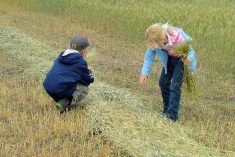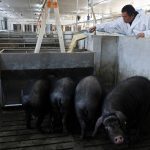It has been a long winter by all accounts. Farmers across the Prairies are anxious to get the seed in the ground. According to the Canadian Agricultural Injury Reporting data, agriculture-related fatalities happen most often from May to October. Of course, this makes sense, as this is when the majority of farming occurs; however, understanding factors that lead to these farm incidents is the first step in preventing injuries.
The greatest part of injury prevention is understanding that small changes and actions can influence major outcomes. For every incident that occurs, there may be as many as 10 to 20 contributing factors. Factors include things like lack of training, fatigue, frustration and poor maintenance. There are steps you can take to lessen the influence of these factors.
Read Also

Gentle treatments for pain in the neck
Heading toward year-end, people unknowingly tense up against the cold and busyness, causing neck pain that can often be treated with appropriate support and gentle mobility, athletic therapist Kathlyn Hossack says.
Planning, preparing and being active in planning tasks and jobs are measures anyone can take before starting or assigning a farming task. Just like in other daily activities, be it washing the dog or making a meal, farm tasks go a lot more smoothly if planning and preparation take place. Do you have the right tools for the job? Are you asking someone to help and are they trained on the task? Is the equipment or tools you are using in good condition? Do you have a plan if something goes wrong? Taking an active role, planning and preparing for a farm task gives you control of the situation.
Physical factors impact how safely a task is performed. Tired? Hungry? Tired and hungry? These factors can make you irritated and frustrated. Take the time to eat well. It’s tempting to eat high sugar and high calorie foods on the go, but this isn’t the optimal fuel for your body. Finding the time to eat a well-balanced meal will pay off. Not only will you get the nutrition you need, but this downtime also gives you the opportunity to slow down and review accomplishments and next steps. Caffeine cannot replace sleep. Fatigued farming leads to bad choices that can lead to a fatal mistake. Follow good sleep hygiene practices There are plenty of resources online with tips on how to achieve a good night’s sleep. Of course, if you still have concerns about nutrition or sleep, talk to your doctor.
Mental factors play a significant role in our lives. Stress, anxiety, depression and mental illness affect how we interact with the world and each other. Mental factors also affect personal safety. Farmers under mental stress are more likely to make critical mistakes like performing tasks incorrectly or forgetting important steps in jobs. (Like shutting off a machine before servicing.) All farmers need to recognize that mental stress can be deadly. Share the burden, talk to others, and take concrete steps to address the factors that you can control like reducing physical hazards on your farm.
Lastly, address the culture on your farm. Is it one of “get it done” at all costs or is it “get it done safely and efficiently”? Turn a critical eye on how the people on your operation operate. Maybe you think that tasks are being performed safely, but is there room for improvement? Using a tool to do a hazard assessment and risk analysis will give you the opportunity to address these issues before they become deadly.
Your safety, the safety of your family and the safety of your workers are — above all — the best investments you can make on your operation. This spring, prepare your farm, your workers and yourself for the most successful season yet. Happy planting! For more information about farm safety, visit casa-acsa.ca.















